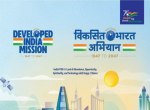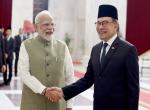The Election Commission has successfully conducted general elections to State Assemblies in Uttar Pradesh, Uttarakhand, Punjab, Goa and Manipur. The results were declared on 6th March, 2012. The Commission is to be complimented on ensuring that even in insurgency hit Manipur the elections were held under tight security in which voters felt safe to cast their votes and there was an excellent turnout of voters. Even in Uttar Pradesh, where it was feared that the elections would be violent, the Election Commission very competently saw to it that peace was maintained and the elections were free and fair. It had been alleged that S.Y. Qureshi, the Chief Election Commissioner, would be biased towards the Congress, but he deserves unstinting praise for the completely bias free election conducted under his directions. The results of the elections are proof of his fairness and impariality because in three States out of five, including in Uttar Pradesh, which is the most populous State, the Congress did very badly indeed. We should be proud of this officer and the Commission headed by him.
There are lessons to be learnt from this election and the first and most important is that the 2012 elections are witness to the decline of the two major parties which can be considered national. The Congress has a presence in every State, has always been considered a middle of the road party and is the party which has been in power longest at the national level. In Bihar and Uttar Pradesh the party has been virtually wiped out, which does not speak highly of its prospects in the coming elections in 2014. Similarly BJP, which has an imposing presence in many States, has fared badly except in Goa. If the second national level party, BJP, is also not to be a serious contender in the 2014 elections, we are bound to have a situation in which there is a splintered parliament and no party would have the strength to lead a stable coalition in which junior partners in the coalition cannot call the tune. A weak coalition means that policies which are in the national interest, though not necessarily in the interest of a component party, cannot be framed or implemented and the government, therefore, would never rise above a lame duck position.
In the case of BJP the party faces a major dilemma. It has a cadre, largely of the RSS, which means that it has a grass-root presence. At the same time its secular credentials are in doubt and there is a popular perception that the party has a somewhat narrow Hindutva agenda, which makes it unacceptable to large sections of people, especially in Southern and Eastern India. If the party wants to come to power at the Centre it was to widen its base in order to increase its acceptability. In order to widen the base the party must abandon a narrow Hindutva programme, but here it runs the danger of losing the RSS cadre. The party, therefore, will have to build a cadre separate from RSS in order to retain a grass-root presence, while moving its own agenda towards a more secular, centrist stance. It remains to be seen whether the party has the courage to take these hard decisions.
When one reads the manifesto of BJP no clear picture emerges about the party’s vision of the India of the future, nor does it place before the people the party’s stand on overall development and sectoral development. In broad terms the party is not clear whether it wants a socialist economy, a mixed economy or an economy in which the private sector has the major role and the public sector is peripheral. There is no specific statement on infrastructure development and role of the State in this behalf, nor is there a clear statement about the education policy for the future and how the State will ensure that high quality education is available to every child in India. There is no policy about health care; the party does not state what the agriculturist can expect of it in the coming years, not the industrialist, the businessman or the worker. Margaret Thatcher, on becoming the Prime Minister of Britain, stated that she would dismantle socialism and then steadfastly in the next eleven years she went about achieving her objective. What course has BJP set itself? Only if BJP comes out with a picture of what people can expect from a BJP government in terms of development in its widest context, will people have a fair chance of deciding whether BJP has a programme which would be of benefit to India and, therefore, they can vote it to power.
The problem with the Congress is not one of acceptability but is the more existentialist question of whether there is such a thing as the Congress party. One senior Congress leader told me that anyone who thinks that there is a Congress party is a fool and that it is the private fiefdom of the Nehru-Gandhi family, to which all Congressmen owe their existence and to whom they have to swear loyalty. This became amply clear in the recent Uttar Pradesh elections. The Congress put all its eggs in the Gandhi family basket. Rahul Gandhi was the star performer who, under suitable tutelage, ran the election campaign in the field, with his sister putting in a star guest appearance and his ailing mother providing support from the sidelines.
What did Rahul Gandhi offer? A circus that might have had some relevance about forty years ago but which is totally obsolete in the India of today. Therefore, the star performer spent time in a Dalit household in which he kept a two-day stubble on his chin. He went on stage, made meaningless speeches, resorted to dramatics and publicly tore a manifesto of the Samajwadi Party which paper, however, was not the manifesto but just a miscellaneous bunch of papers of no consequence. He went to constituencies that had a sizable Muslim presence and there he sported a beard so that in looks he could appear to be Muslim. The Muslims were promised reservation in jobs, an enquiry into the Batala House encounter and many empty promises to protect the Muslims. The agenda was obviously communal because nothing positive was mentioned about Muslim education, emancipation of Muslim women, a development agenda based on job creation rather than just reservations, economic uplift and improvement of the Muslim social structure. What Rahul Gandhi offered would probably have worked four decades ago when the Muslims voted en masse. It did not work in 2012. Personal security, notwithstanding aberrations, including Bombay in 1993 and Gujarat in 2002, is now taken as a right by Muslims. The Muslims are aware of their backwardness, but they have done introspection and are prepared to accept that it is their low level of education which is a major factor in keeping them backward. The average Muslim wants access to education, vocational training for children which can make them employable, creation of job opportunities through economic development and equal opportunities in employment coupled with affirmative action. Reservation is the least of the Muslim priorities. On none of these issues did Rahul Gandhi or the Congress make any significant contribution, which has caused the Muslims to turn away from the Congress.
The communal card no longer holds validity in today’s India. Nitish Kumar realised this and his entire election campaign was based on a development agenda. That is why his BJP partners were able to get Muslim votes in Bihar. In Gujarat Narendra Modi never speaks of the Muslims and 2002 notwithstanding, the development momentum which has been unleashed in Gujarat has also improved economic opportunities for the Muslims, benefitted them in improving their economic status and, therefore, has brought about a better law and order environment in the State. Therefore, in local body elections a number of Muslim candidates preferred the BJP and were successful in the elections. This point is made not as an apology for Narendra Modi, but rather as a pointer to what the Muslim needs. No Indian Muslim wants separation from India nor would he like to migrate to Pakistan. Every Indian Muslim accepts India as his own country. This has buried the ghost of 1947 and political parties should not try to revive it. The Muslim wants education for his children, safety for himself, honour and dignity for his women folk and job opportunities and a business environment in which the Muslim can prosper. The party which gives him this, which is exactly what every other community wants, will win the next election. Rahul Gandhi’s 2012 agenda promises none of these and does not bode well for the party.
The Congress, like BJP, has not placed before the people any worthwhile agenda of governance which could enable the people to decide whether the Congress is the right party to be voted to power. At least Indira Gandhi gave such slogans as “gareebi hataao”. Sonia Gandhi’s Congress does not even give this sort of a slogan. How can a party which has no worthwhile economic agenda to offer, but is dependent almost entirely on caste and an effort to woo voters on account of religion call itself a national party and hope that the people of twenty-first century India will vote it to power?
The entire planning process set in motion by Jawaharlal Nehru with the first Five-Year Plan was as much an economic statement as a political one. The Plan, with its priorities, was and is a government document, but because it is approved by a government whose composition has to be political, it is also a statement of the ruling party’s ideology and programmes. That was perhaps true for the five initial Plans. Thereafter the planning process has become bureaucratic rather than reflective of the wider thinking of government and the means of converting this thinking into a concrete plan of action. Unless the Congress Party once again begins to take the people of India into confidence about where they want lead India to, the party can neither aspire for national power, nor deserve it.
The growth of regional parties is a repeat of what happened after the emergency and the defeat of Indira Gandhi in 1977. In the last two decades of the twentieth century one saw signs of reemergence of national parties, including the Left Front. 2012 has reversed this trend and the regional parties are becoming powerful. As I have already stated, this is not a promising sign.
The government of Atal Bihari Vajpayee and the two governments presided over by Dr. Manmohan Singh have had to face the same dilemma, generally speaking from the same opposition parties, which were or are in coalition with the party in power, that is, the most outrageous demands from coalition partners and the continuous threat of withdrawal of support, which would cause the government to collapse. In turn this has led to the dominant partners of the coalition continually striving to retain power and, for that purpose, to make totally unacceptable concessions to the alliance partners.
Let us take the current scenario. The scheme of the Constitution is federal, with strong centripetal forces. The Constitution gives the States certain independent powers and also prescribes the relationship between the state governments and the federal government. As per List 1 and 2 of the Seventh Schedule of the Constitution, the exclusive powers of the Union and the States are prescribed. If federalism demands that the Central Government should not dabble in state affairs, it also demands that the States should not intrude into areas where the Central Government has the constitutional authority. For example, foreign relations and international treaties are exclusively within the domain of the Centre as per Entries 10 and 14 of List 1 of the Seventh Schedule. Similarly, as per Item 221 List 1 of the Seventh Schedule Railways are within the exclusive jurisdiction of the Centre. No State Government has the right to interfere in these matters or to force the Central Government to adopt a particular policy dictated by the State. The Prime Minister wanted to make certain concessions to Bangladesh, of which a treaty on the sharing of the waters of Teesta River was one of the components. It is legitimate for the Chief Minister of West Bengal to put forward the case of the State regarding the consequences of the Teesta water treaty, but it is neither legitimate for her to block the treaty or for the Prime Minister to surrender to the demands of a Chief Minister. A treaty with a neighbouring country which benefits both is more important than the rights of a riparian State in India. Unfortunately the equation within Parliament which has made Mamata Banerjee’s party a key factor in supporting government seems to have outweighed the considerations of an amicable relationship with Bangladesh. The Central Government should have consulted the West Bengal Government, but for the West Bengal Government to have blocked an international treaty which had larger ramification than those within West Bengal alone is itself a breach of the federal principle. This has been possible only because the electorate has given to India a hung parliament in which compromise has replaced principled policy as a means of government.
The latest fiasco over the railway budget explains the danger of the growth of regionalism at the cost of national parties. The railway budget is required to be drawn up by the Union Minister of Railways who, together with his cabinet colleague, is responsible to the House of the People under Article 75(3) of the Constitution. He is not responsible to the chief of the political party to which he belongs and which is a coalition partner. For Mamata to insist that the Railway Minister should resign or be dismissed because of the provisions of the railway budget, of which she did not approve, is a clear violation of federal principle because here it is the Prime Minister and Parliament to whom the Minister is accountable, not Mamata Banerjee. Similarly, for a coalition partner to demand that a particular portfolio should be in the exclusive domain of that party goes against every principle of democratic government. This all the more dangerous because one hears bazaar gossip that the price that the Samajwadi Pary is demanding for its support of the Central Government is that the Defence Ministry be given to Mulayam Singh Yadav. At a time when the Defence Ministry is engaged in the most delicate negotiations for acquisition of weapons and weapon system worth lakh of crores of rupees the Minister should not be changed, especially because Mr. A.K. Anthony has a reputation for total personal integrity. If to save its own skin the Congress party succumbs to these demands, then the party has no right to rule this country. That is one of the major lessons which have emerged from the state elections of 2012.
First and foremost the Prime Minister should have the courage to tell his coalition partners that not only they, but all parties and all State Governments would be consulted in matters of national interest but also that the ultimate decision would be that of Central Government and that would be binding. He must make it clear to the coalition partners that once a decision is taken by the cabinet it applies to everyone, even to those cabinet ministers who come from allied parties and not from the Congress Party. He must also make it clear that beyond a point the coalition partners will not be allowed to dictate terms and if this causes the government to fall fresh elections would be held. Whatever is in the national interest should be done, including a massive effort by the two major parties to ensure that in the next elections the importance of the regional parties is reduced and the major parties get a clear run to bring proper government to India.
Published Date : 21th March, 2012









Post new comment